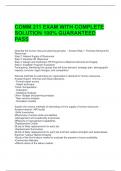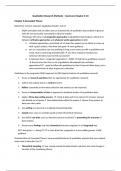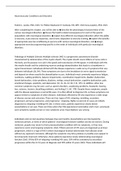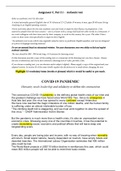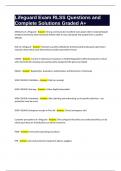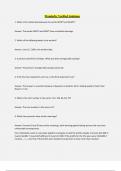Waiting For Godot
Written by: Samuel Beckett
When: 1948-1949
First performed: 1953
Genre: Tragicomedy
Style: Absurd
Characters: Lucky, Pozzo, Vladimir, Estragon, the boy, Godot
Waiting for Godot was first written in French between October 1948 and January
1949
- Beckett's theatrical imagery for this play is stark and minimalist
- Two tramp-clowns (clochards/beggars/vagrants), Estragon and Vladimir,
wait for someone called Godot to come
- They hope that his visit will 'save' them
- They fill 'the terrible silence that is waiting to flood into this play like
water into a sinking ship’ with banter and repeated actions
- Two other passers-by (Pozzo and Lucky) arrive to provide a distraction
(and display a view of life as a series of purposeless movements)
- After the visitors have left, a boy messenger comes to inform them that Mr
Godot will not come today, but will certainly come tomorrow
- The same pattern is repeated with significant variations in the second act:
Lucky has become mute; Pozzo has gone blind
- But a boy messenger returns to convey the same message about Mr
Godot. Such apparent simplicity disguises some profound themes: life's
brevity and its pain; the human need for something to confer meaning on
a mysterious existence; in its absence, a compensatory need for friendship
to protect and sustain, yet fail to satisfy; and, above all, a radical
uncertainty which characterizes every aspect of the two friends' lives
- Man is seen, in Beckett's own words, as a 'non-know-er, a non-can-er'
, The playwright and is intentions
Samuel beckett (1906 -1989)
- Irish playwright, theatre director, novelist and poet
- One of the most influential writers of the 20th century
- Played a pivotal role in the revitalisation of the modernist movement and
was often associated with the ‘Theatre of the Absurd’
- His work tends to shun conventional plotting or structure while exploring
the human condition in ways that are both bleakly humorous and
profound, where laughter is a weapon against despair
Early life and Paris
- Born in Dublin in 1906
- Studied French, Italian and English at Trinity college
- Raised in a protestant home
- Light heavyweight boxing champion and opening batsman
- Passionate in chess and bridge
- First class honors in French and Italian
- Lectured at a prestigious college in Paris
- Met James Joyce and published first essay
- Went to Paris for the first time in 1928 – spent most adult life – teach
English
- Pathologically shy and detested self-exposure of lecturing
- Auto-critic
- Resigned after 4 terms and set out to become a writer, translator and
literary journalist
- 1933 cousin and father died – prolonged depression – collection of short
stories
- 1936-1937 he spent six months travelling around Germany
- During this time he saw Casper David Friederich’s painting Two Men
Observing the Moon (a painting to which he referred in the production
notebooks for Godot)
- He also met the Munich comedian Karl Valentin, a man he describes as
“exuding depression”
- Returned home for six months before taking up residence in Paris once
more. He renewed his friendship with Joyce’s circle and with a number of
avant-garde (ahead of its time, futuristic, ultramodern) artists
- Brief affair with heiress and art collector Peggy Guggenheim
- Stabbed by a man in the street who approached him asking for money
- After his recovery in hospital, Beckett went to visit his assailant in prison
- When he asked the other man why he had attacked him, he replied “I
don’t know, Sir”, a phrase hauntingly used by the Boy in the Waiting for
Godot
- Recovering in hospital he began a close friendship with Suzanne
Deschevaux-Dumesnil
- war broke out he was visiting his mother in Ireland, but he immediately
returned to France to be with Suzanne
- 1941 he joined a Resistance group
, - A year later when the group was betrayed to the Gestapo, Beckett and
Suzanne took refuge in Provence
The war
- Decisive influence on Beckett
- Appreciate danger, anxiety and deprivation intellectually and live them
- Channeling secret information
- Anguish of waiting for contacts in dangerous circumstances
- Seeing friends betrayed and hearing of their torture and death
- Hiding in fields and ditches
- Being permanently hungry and suffering
- Volunteered to work for five months in a hospital run by the red cross in
Normandy
- Worked as a courier for the French resistance
- Many difficulties with mental health
- Psychotherapy and enduring interest in schizophrenia, obsessional
neuroses
- Many aspects of his later works were born out of his experiences of
uncertainty, disorientation, danger, deprivation, and exile
Playwriting
- Translated from one language to another
- Emphasis on silence and repetition confused some critics
- Increasingly experimental and minimalist – stripped down to essential
elements
- 1946 – prolific period of writing
- French – discipline and economy of expression that an acquired language
would force upon him
- Exuberance commonly associated with theatre circles not for him
- He had also attended the music hall, circus and cinema, and developed a
special admiration for Buster Keaton and Charlie Chaplin. He was always
drawn to melancholy clowns, and was deeply moved by his meeting with
Karl Valentin in 1937 as he felt this comedian exuded depression
“The theatre allows Beckett a double freedom; the opportunity to
explore the black spaces between the words and the ability to provide
visual evidence of the untrustworthiness of language.”
Novel writing and later life
- Published 3 novels
- A very secretive man who refused to do interviews or comment on his
work
- Broadly left wing and anti-establishment (not a communist)
- Natural sympathy for the underdog, victim, down-and-out, prisoner
- Never allowed art to become part of a political agenda
- Firm supporter of human rights, fierce opponent of all forms of censorship
and repression
Written by: Samuel Beckett
When: 1948-1949
First performed: 1953
Genre: Tragicomedy
Style: Absurd
Characters: Lucky, Pozzo, Vladimir, Estragon, the boy, Godot
Waiting for Godot was first written in French between October 1948 and January
1949
- Beckett's theatrical imagery for this play is stark and minimalist
- Two tramp-clowns (clochards/beggars/vagrants), Estragon and Vladimir,
wait for someone called Godot to come
- They hope that his visit will 'save' them
- They fill 'the terrible silence that is waiting to flood into this play like
water into a sinking ship’ with banter and repeated actions
- Two other passers-by (Pozzo and Lucky) arrive to provide a distraction
(and display a view of life as a series of purposeless movements)
- After the visitors have left, a boy messenger comes to inform them that Mr
Godot will not come today, but will certainly come tomorrow
- The same pattern is repeated with significant variations in the second act:
Lucky has become mute; Pozzo has gone blind
- But a boy messenger returns to convey the same message about Mr
Godot. Such apparent simplicity disguises some profound themes: life's
brevity and its pain; the human need for something to confer meaning on
a mysterious existence; in its absence, a compensatory need for friendship
to protect and sustain, yet fail to satisfy; and, above all, a radical
uncertainty which characterizes every aspect of the two friends' lives
- Man is seen, in Beckett's own words, as a 'non-know-er, a non-can-er'
, The playwright and is intentions
Samuel beckett (1906 -1989)
- Irish playwright, theatre director, novelist and poet
- One of the most influential writers of the 20th century
- Played a pivotal role in the revitalisation of the modernist movement and
was often associated with the ‘Theatre of the Absurd’
- His work tends to shun conventional plotting or structure while exploring
the human condition in ways that are both bleakly humorous and
profound, where laughter is a weapon against despair
Early life and Paris
- Born in Dublin in 1906
- Studied French, Italian and English at Trinity college
- Raised in a protestant home
- Light heavyweight boxing champion and opening batsman
- Passionate in chess and bridge
- First class honors in French and Italian
- Lectured at a prestigious college in Paris
- Met James Joyce and published first essay
- Went to Paris for the first time in 1928 – spent most adult life – teach
English
- Pathologically shy and detested self-exposure of lecturing
- Auto-critic
- Resigned after 4 terms and set out to become a writer, translator and
literary journalist
- 1933 cousin and father died – prolonged depression – collection of short
stories
- 1936-1937 he spent six months travelling around Germany
- During this time he saw Casper David Friederich’s painting Two Men
Observing the Moon (a painting to which he referred in the production
notebooks for Godot)
- He also met the Munich comedian Karl Valentin, a man he describes as
“exuding depression”
- Returned home for six months before taking up residence in Paris once
more. He renewed his friendship with Joyce’s circle and with a number of
avant-garde (ahead of its time, futuristic, ultramodern) artists
- Brief affair with heiress and art collector Peggy Guggenheim
- Stabbed by a man in the street who approached him asking for money
- After his recovery in hospital, Beckett went to visit his assailant in prison
- When he asked the other man why he had attacked him, he replied “I
don’t know, Sir”, a phrase hauntingly used by the Boy in the Waiting for
Godot
- Recovering in hospital he began a close friendship with Suzanne
Deschevaux-Dumesnil
- war broke out he was visiting his mother in Ireland, but he immediately
returned to France to be with Suzanne
- 1941 he joined a Resistance group
, - A year later when the group was betrayed to the Gestapo, Beckett and
Suzanne took refuge in Provence
The war
- Decisive influence on Beckett
- Appreciate danger, anxiety and deprivation intellectually and live them
- Channeling secret information
- Anguish of waiting for contacts in dangerous circumstances
- Seeing friends betrayed and hearing of their torture and death
- Hiding in fields and ditches
- Being permanently hungry and suffering
- Volunteered to work for five months in a hospital run by the red cross in
Normandy
- Worked as a courier for the French resistance
- Many difficulties with mental health
- Psychotherapy and enduring interest in schizophrenia, obsessional
neuroses
- Many aspects of his later works were born out of his experiences of
uncertainty, disorientation, danger, deprivation, and exile
Playwriting
- Translated from one language to another
- Emphasis on silence and repetition confused some critics
- Increasingly experimental and minimalist – stripped down to essential
elements
- 1946 – prolific period of writing
- French – discipline and economy of expression that an acquired language
would force upon him
- Exuberance commonly associated with theatre circles not for him
- He had also attended the music hall, circus and cinema, and developed a
special admiration for Buster Keaton and Charlie Chaplin. He was always
drawn to melancholy clowns, and was deeply moved by his meeting with
Karl Valentin in 1937 as he felt this comedian exuded depression
“The theatre allows Beckett a double freedom; the opportunity to
explore the black spaces between the words and the ability to provide
visual evidence of the untrustworthiness of language.”
Novel writing and later life
- Published 3 novels
- A very secretive man who refused to do interviews or comment on his
work
- Broadly left wing and anti-establishment (not a communist)
- Natural sympathy for the underdog, victim, down-and-out, prisoner
- Never allowed art to become part of a political agenda
- Firm supporter of human rights, fierce opponent of all forms of censorship
and repression

